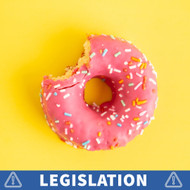UK Government U-Turns on HFSS Promotions
Posted by Emily on 11th Jul 2025 Reading Time:
The UK government has announced plans to scrap key elements of its controversial policy on restricting the promotion of foods high in fat, sugar, and salt (HFSS). Under Prime Minister Sir Keir Starmer's new 10-year health strategy, the approach is shifting from rigid restrictions to "smarter regulation", favouring industry collaboration over legislative bans.
The HFSS Ban: What Was Planned
The original legislation aimed to tackle obesity by limiting both the visibility and affordability of HFSS products. From October 2023, supermarkets were prohibited from displaying such products in prominent store locations, including end-of-aisle displays and checkout areas. A further ban on volume price promotions—such as buy-one-get-one-free (BOGOF) offers—was scheduled to take effect from 1 October 2025, having previously been delayed due to concerns about the cost of living.
However, both policies are now poised for repeal under Labour's new public health agenda, which prioritises outcomes and flexibility over prescriptive rules.
Reformulation Was Already Underway
The HFSS regulations triggered significant reformulation efforts across the food and drink sector. Brands like Kellogg's (formerly Kellanova), PepsiCo, and Mars responded by reformulating their products to meet the HFSS compliance thresholds.
For instance, Kellogg reduced sugar content by 10% across its children's cereal range and pledged to cut salt in Special K. PepsiCo reformulated Doritos to meet the HFSS criteria. At the same time, Mars-owned KIND reworked its Breakfast Almond Butter bar by replacing fat-dense nuts with grains such as oats, millet, and quinoa. These changes not only pre-empted legislation but also aligned with broader consumer trends toward healthier eating.
A New Era of Accountability
The scrapping of HFSS promotional restrictions does not signal a retreat from public health goals. Instead, the government is introducing a mandatory reporting system for large food businesses. Companies will be required to disclose the proportion of their sales considered "healthy", with new targets set to improve the average nutritional quality of UK shopping baskets gradually.
Businesses will retain the freedom to decide how to meet these targets—be it through reformulation, new product lines, store layout changes, or customer incentives. The government believes that this flexibility will enable innovation while maintaining momentum in addressing obesity.
More Changes Ahead
Additional health-focused interventions are also under consideration. These include:
- A ban on the sale of high-caffeine energy drinks to children.
- Mandatory health warnings and nutritional labelling on alcoholic beverages.
These proposals suggest that while the HFSS promotions ban may be abandoned, the government remains firmly committed to reshaping consumer habits and reducing obesity rates.
Industry Reaction
Initial responses from the food industry have been broadly supportive. The Institute of Grocery Distribution (IGD), co-secretariat to the new Food Strategy Advisory Board, described the policy shift as "a real opportunity" for more effective collaboration between government departments and the food sector.
However, this reversal raises questions for devolved governments—particularly in Scotland, which recently indicated plans to follow the UK's earlier HFSS approach. Policymakers north of the border may now be forced to reassess.





